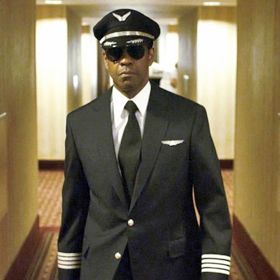'Flight' Takes Off, But Doesn't Soar

4/5
Flight is both blessed and cursed by its opening half hour. In the film's early minutes, director Robert Zemeckis takes the audience on a tense ride as we follow commercial airline pilot Whip Whitaker (Denzel Washington) on the morning of what should be a routine flight from Orlando to Atlanta. Whitaker looks like hell, having just pulled an all-nighter filled with sex, drugs and alcohol. His face is tired, his short hair somehow disheveled; after fielding a call from his disgruntled ex-wife, he takes a swig of a half-finished beer and snorts a line of cocaine to get himself right.
The next shot is of Whitaker in full pilot’s garb, his tired eyes hidden behind a pair of aviator sunglasses. This is where things get interesting. Flight’s marketing campaign tells you right off the bat that this plane is going to crash, so the suspense manifests itself in the events leading up to the tragedy, and the entire sequence from wheels up to crash down is a pulsating experience in which Zemeckis teases the audience with the threat of a disaster we all know is about to come. I felt like a detective in the beginning of this movie, noting each and every detail as Whitaker did his walkabout the plane and took his seat in the cabin.
But Flight goes in a different direction after the plane crash, veering away from the event to a more concerted focus about one man and his addiction. When Whitaker awakes from the crash, he learns that his blood has been taken and that it contained large traces of cocaine and alcohol. Consequently, one of the film’s conflicts centers around Whitaker the pilot, and whether he should go to jail for being impaired while flying, while the other, more central plot focuses on Whitaker the man. The remaining two hours of the film is largely devoted to Whitaker’s fight to get sober.
The character study of an alcoholic trying to decide between saving his skin and doing what’s right is an intriguing one — yes — and Flight handles character development masterfully. We genuinely care about this man by the closing credits. But after going from a tense pace in the opening minutes to slow and methodical is an unwelcome jolt, and it felt at times like the human story overwhelmed the informational element in play. It would have been fascinating to dive deeper into the world of commercial airline politics, the airline unions, and the logistics of a plane crash investigation.
Appearances by John Goodman as Whitaker’s substance abuse pal Harlan, Don Cheadle as Hugh Lang, the attorney fighting to keep Whitaker out of prison, and Melissa Leo as Ellen Brock, a hard-nosed interrogator trying to prove Whitaker’s guilt, are welcomed screen presences who bolster this film’s fine cast. And really, Washington is outstanding as Whitaker, a man masking a secret.
But there is something unsatisfying about the film's closing minutes, a noticeable absence of stories untold and opportunities missed. I know almost as much about how criminal pilot cases are conducted after seeing the movie as I did before. Flight had the chance to not only give us a look inside a troubled man, but also a look into a fascinating world. More importantly, Flight had the chance to not only be good, but great, and coming up just short has to count for something.
RELATED ARTICLES
Get the most-revealing celebrity conversations with the uInterview podcast!







Leave a comment